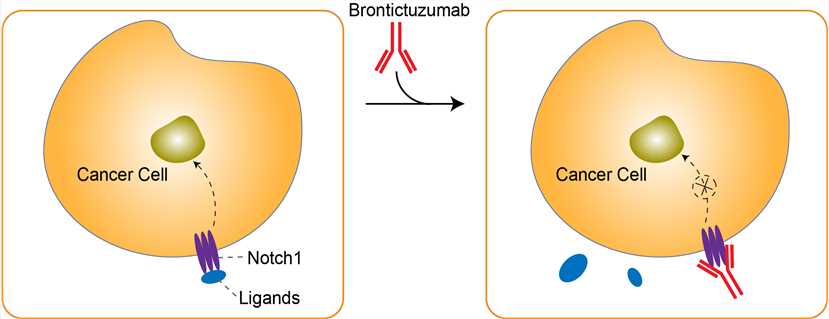Brontictuzumab Overview
Introduction of Brontictuzumab
Brontictuzumab (also known as OMP-52M51) is a fully human monoclonal antibody (mAb) which could target the Human NOTCH1 antigen and inhibit pathway activation. It is an investigational drug and has been used in trials studying the treatment of Adenoid Cystic Carcinoma, Relapsed or Refractory Solid Tumors, and Relapsed or Refractory Lymphoid Malignancies. Pan-notch inhibitors such as gamma-secretase inhibitors (GSIs) are currently in clinical development. However, their applicability has been limited mainly due to significant on target toxicity, particularly diarrhea induced by Notch inhibition in the intestinal crypts. Brontictuzumab specifically inhibits Notch1, therefore potentially mitigating significant intestinal toxicity. Brontictuzumab has shown tumor growth inhibition in various patient-derived xenograft models and it caused only mild goblet cell metaplasia compared with severe metaplasia in mice treated with GSI.
Mechanism of Action of Brontictuzumab
The Notch pathway plays a key role in regulating cell fate decisions in normal development and in many cancer types. Notch1 is the most studied of four receptors (Notch 1-4) and its deregulation can lead to changes in cancer-relevant functions such as proliferation, stemness, epithelial mesenchymal transition, and angiogenesis. Subsequent to ligand binding, Notch proteins ultimately undergo cleavage by the gamma-secretase complex, which releases the Notch intracellular domain (NICD) to migrate to the nucleus and activate transcription of Notch target genes. Most NOTCH1 activating mutations are located in the NRR, which leads to ligand-independent receptor proteolysis, or in the PEST domain, which prevents rapid degradation of the cleaved receptor. Other mechanisms of Notch1 activation include overexpression of functional Notch ligands (DLL 1, 4 and JAG 1, 2), mutations in negative regulators of NICD stability, and up-regulation by miRNA dependent epigenetic events. Notch1 has pleiotropic roles and can function as an oncogene or tumor suppressor, depending on the cellular context, highlighting the importance of tumor selection in the clinical development of Notch1 inhibitors. Brontictuzumab is a full-length IgG2 humanized monoclonal antibody that selectively binds the Notch1 juxta membrane negative regulatory region (NRR) and inhibits signaling by stabilizing its quiescence irrespective of the ligand. Upon administration, brontictuzumab binds to Notch-1 on the cell surface, thereby inhibiting Notch-mediated signaling and tumor cell proliferation.

Fig 1. Mechanism of Action of Brontictuzumab
For research use only. Not intended for any clinical use.
This site is protected by reCAPTCHA and the Google Privacy Policy and Terms of Service apply.

